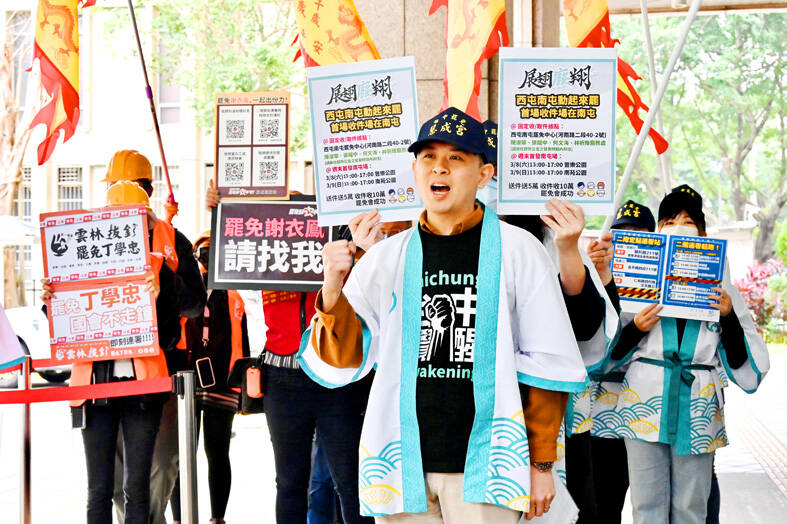Advocates to recall Chinese Nationalist Party (KMT) lawmakers in central Taiwan yesterday went to the Central Election Commission’s (CEC) office in Taipei to collect petition forms for the second stage of their recall campaign.
As of yesterday, 32 recall proposals against KMT lawmakers, two against Democratic Progressive Party (DPP) Nantou County councilors and one against suspended Hsinchu Mayor Ann Kao (高虹安) had passed their first-phase review.
Campaigners yesterday picked up second-stage petition forms to recall KMT lawmakers based in Taichung, Yunlin County and Changhua County; namely, Ting Hsueh-chung (丁學忠), Yen Kuan-heng (顏寬恒), Yang Chiung-ying (楊瓊瓔), Liao Wei-hsiang (廖偉翔), Huang Chien-hao (黃健豪) and Lo Ting-wei (羅廷瑋).

Photo: George Tsorng, Taipei Times
The second stage of the petition to recall KMT Changhua County Legislator Hsieh Yi-feng (謝衣鳳) would not begin until Friday next week, as campaigners have not yet collected petition forms.
Dentist Shih Shu-hua (史書華), head of the campaign to recall New Taipei City KMT Legislator Yeh Yuan-chih (葉元之), also picked up second-stage petition sheets from the CEC yesterday.
Twelve recall petitions against DPP lawmakers failed to meet the required signatures for the first stage, but KMT Youth League member Lee Hsiao-liang (李孝亮) yesterday submitted 2,637 supplementary signatures for the recall of DPP Legislator Wu Pei-yi (吳沛憶).
Meanwhile, DPP spokesman Justin Wu (吳崢) and attorney Huang Di-ying (黃帝穎) yesterday at the Taipei District Prosecutors’ Office filed charges against the KMT for including petition signatures of dead people.
In response, Lee said that recall groups could not know whether a petitioner is dead or alive solely from their signature.
The CEC in a statement reiterated that local household registration offices are responsible for reviewing such reports and identifying petition signatures of dead people.
Their review results would next be handed to local election committees for initial review, with confirmed cases reported to the CEC for final review, it said.

A magnitude 4.9 earthquake struck off Tainan at 11:47am today, the Central Weather Administration (CWA) said. The hypocenter was 32.3km northeast of Tainan City Hall at a depth of 7.3km, CWA data showed. The intensity of the quake, which gauges the actual effect of a seismic event, measured 4 in Tainan and Chiayi County on Taiwan's seven-tier intensity scale, the data showed. The quake had an intensity of 3 in Chiayi City and County, and Yunlin County, while it was measured as 2 in Kaohsiung, Nantou County, Changhua County, Taitung County and offshore Penghu County, the data showed. There were no immediate reports of

Weather conditions across Taiwan are expected to remain stable today, but cloudy to rainy skies are expected from tomorrow onward due to increasing moisture in the atmosphere, according to the Central Weather Administration (CWA). Daytime highs today are expected to hit 25-27°C in western Taiwan and 22-24°C in the eastern counties of Yilan, Hualien, and Taitung, data on the CWA website indicated. After sunset, temperatures could drop to 16-17°C in most parts of Taiwan. For tomorrow, precipitation is likely in northern Taiwan as a cloud system moves in from China. Daytime temperatures are expected to hover around 25°C, the CWA said. Starting Monday, areas

Taiwan has recorded its first fatal case of Coxsackie B5 enterovirus in 10 years after a one-year-old boy from southern Taiwan died from complications early last month, the Centers for Disease Control (CDC) said yesterday. CDC spokesman Lo Yi-chun (羅一鈞) told a news conference that the child initially developed a fever and respiratory symptoms before experiencing seizures and loss of consciousness. The boy was diagnosed with acute encephalitis and admitted to intensive care, but his condition deteriorated rapidly, and he passed away on the sixth day of illness, Lo said. This also marks Taiwan’s third enterovirus-related death this year and the first severe

A Taiwanese software developer has created a generative artificial intelligence (AI) model to help people use AI without exposing sensitive data, project head Huang Chung-hsiao (黃崇校) said yesterday. Huang, a 55-year-old coder leading a US-based team, said that concerns over data privacy and security in popular generative AIs such as ChatGPT and DeepSeek motivated him to develop a personal AI assistant named “Mei.” One of the biggest security flaws with cloud-based algorithms is that users are required to hand over personal information to access the service, giving developers the opportunity to mine user data, he said. For this reason, many government agencies and